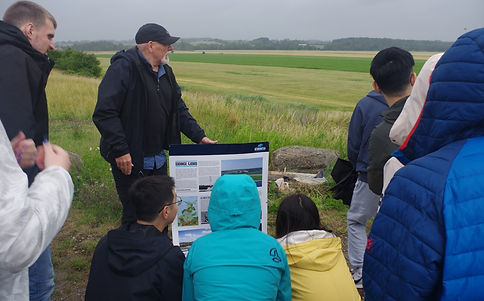Ph.D. Summer Course Recap: “Global farmland abandonment: patterns, drivers and implications.”
Our Ph.D. course, running this summer from July 3rd to July 7th, 2023, in Copenhagen, aimed to unite students and researchers keen on exploring farmland abandonment from diverse scientific angles. This global land change process, particularly prevalent in Europe, was the focal point. We strived to empower students in selecting the right methods and datasets to analyze this phenomenon. Alexander Prishchepov, Simona Gradinaru, Miroslava Bavorova, He Yin, and Torben Birch-Thomsen were the instructors for this course, and a total of 14 students and postdocs joined the school (Daria Bedrinova, Guanqiao Ding, Hang Chen, Hao Xia, Olasoji Oluwaseyi Adurapemi , Pau Sallent Bayà, Rahat Tufail, Shengping Ding, Taiwo Oladapo Babalola, Wanting Yang, Xin Xu, Yuyang Chang, Aleksandra Wasik, Ayat Ullah).



The curriculum featured lectures delving into farmland abandonment study history, measurement approaches, and empirical toolboxes to understand the causal factors and implications for environmental processes. We emphasized grasping the theoretical aspects, including behavioral mechanisms in agricultural land abandonment, the role of policies and potential reuses. Practical exercises and a day field trip to Danish landscapes with different land-use intensities, including recently retired lands for rewilding, enriched the experience.
In addition to lectures and practical exercises, students took the opportunity to present their works on farmland abandonment topics and receive individual feedback. Further written essays were used to provide detailed written comments and grant a course certificate. Overall, based on anonymous reports and evaluations of essays, the school was a super success. And we also enjoyed Copenhagen!
The school helped underscore the complexity of studying farmland abandonment, such as its definitions, but also the ways we can measure, map, and compare farmland abandonment across different parts of the world. Thus, we often welcome clear definitions of what abandoned lands comprise. Additionally, clear theoretical mechanisms, along with conceptual frameworks, are needed to ground research on studying the drivers of farmland abandonment. We are looking forward,and in the upcoming years, the Farmland Abandonment Working Group will enable us to uncover these and other existing research gaps and challenges while also bringing together the research community and early-career scientists.
We extend our gratitude to the University of Copenhagen and other sources of funds, as well as the incredible support from Mikala Heckscher, Julie Leander Kramme, and Kitt Vium Bjørn, and all who came and contributed through this week to the summer school. Please find the school's program here, as well as an outline of the one-day field trip.


